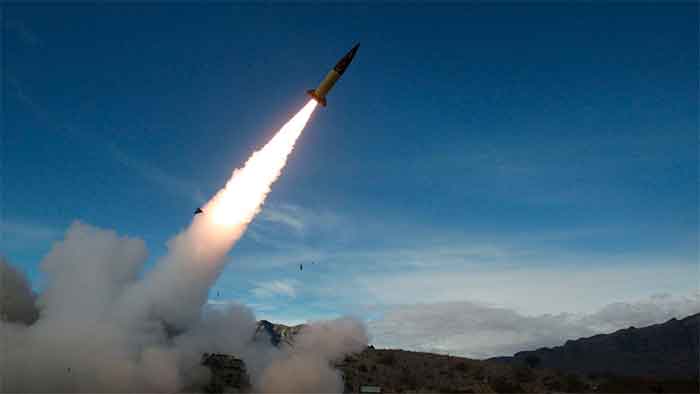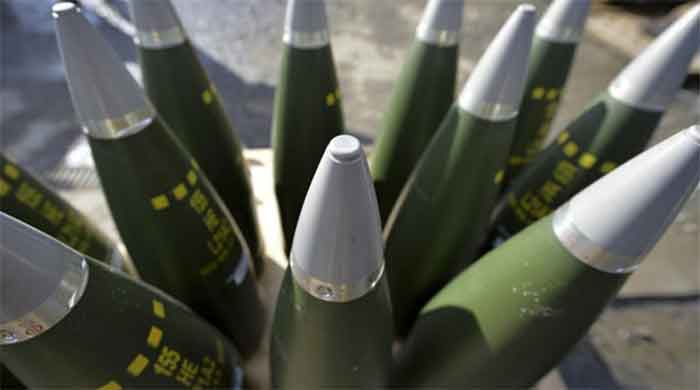
U.S. is gaining from war in Europe.
A Wall Street Journal report (How War in Europe Boosts the U.S. Economy, Sun, Feb 18, 2024) said:
‘Proponents of support for Ukraine usually invoke U.S. strategic interests or moral obligations. Lately, they are making a more calculating case: It is good for the economy.
‘In the two years since Russia invaded Ukraine, the U.S. defense industry has experienced a boom in orders for weapons and munitions. Business is coming from European allies trying to build out their military capabilities as well as from the Pentagon, which is both buying new equipment from defense manufacturers and replenishing military stocks depleted by deliveries to Ukraine.
‘Industrial production in the U.S. defense and space sector has increased 17.5% since Russia launched its full-scale invasion of Ukraine two years ago, according to Federal Reserve data.
‘Biden administration officials say that of the $60.7 billion earmarked for Ukraine in a $95 billion supplemental defense bill, 64% will actually flow back to the U.S. defense industrial base.
‘“That is one of the things that is misunderstood…how important that funding is for employment and production around the country,” Lael Brainard, director of the White House National Economic Council, said in an interview Wednesday.’
The report said:
‘While war often has economic spinoffs, these are occurring without the U.S. actually doing any of the fighting.
‘Recent spending by European governments on U.S. jet fighters and other military hardware represents “a generational-type investment. The past few years are equal to the prior 20 years,” said Myles Walton, a military industry analyst at Wolfe Research.
‘While the $95 billion aid package, which also includes funds for Israel and Taiwan, passed the Senate on Feb. 13, its fate is uncertain in the House, where it is opposed by Republican allies of former President Donald Trump, front-runner for the GOP presidential nomination.
‘Among their objections: The U.S. cannot afford to support Kyiv as federal deficits mount, Russia would prevail anyway, and the U.S. needs to better secure its own border before providing more aid overseas.’
The Wall Street Journal report said:
‘The latest money, on top of previous commitments, could inject funds worth about 0.5% of one year’s gross domestic product into the U.S. industrial defense base over several years.
‘The State Department recently said the U.S. made more than $80 billion in major arms deals in the year through September of which about $50 billion went to European allies — more than five times the historical norm, said Walton.
‘Poland has placed orders worth about $30 billion for Apache helicopters, High Mobility Artillery Rocket Systems, or Himars, M1A1 Abrams tanks and other hardware, the department said. Germany spent $8.5 billion on Chinook helicopters and related equipment, while the Czech Republic bought $5.6 billion of F-35 jets and munitions.’
It said:
‘The boost to the U.S. defense industry is just one way the fragmentation of the world economy along geopolitical lines is tightening U.S.-European relations , often to the benefit of the U.S.
‘The cutoff of Russian gas supplies sent energy prices and inflation up sharply in Europe, while boosting European demand for U.S. liquefied natural gas.
‘The U.S. became the world’s largest LNG exporter last year, and its LNG exports are expected to almost double by 2030 on already-approved projects. Around two-thirds of those exports go to Europe .
‘Five new LNG projects are being constructed in the U.S., representing investments of around $100 billion in total, said Alex Munton, director of global gas and LNG research at Rapidan Energy Group. Most of those projects only began construction after the start of the Ukraine war, he said, as the disruption to Europe’s gas supplies proved the value of LNG to potential backers and helped to move planned projects forward. “The U.S. economy benefits significantly because of these massive investments,” Munton said.’
The report said:
‘Foreign direct investment to the U.S. increased by almost 50% between the 12 months through June 2021 and the same period in 2023, according to the Paris-based Organization for Economic Cooperation and Development, an association of market-based democracies. European companies in particular are lured by access to cheap and abundant energy.
‘Military aid is, by itself, no economic panacea. While defense companies are adding jobs, those tied to Ukraine are a relatively small share of national employment and income. “I do not think you can say confidently that the U.S. economy is larger as a result of the war, but certain sectors of the economy are certainly larger,” said Marc Goldwein, senior policy director for the Committee for a Responsible Federal Budget.’
It said:
‘The money also takes time to flow. Congress has to authorize funds to replenish Pentagon stocks, and then the Pentagon has to sign contracts for new equipment. Foreign sales of major weapons can take years and sometimes fall through. Poland’s annual military budget is about $16 billion, so it is not clear how the country can pay for $30 billion of new weapons orders anytime soon, said William Hartung, senior fellow at the Quincy Institute for Responsible Statecraft.
‘“We know that there are tens of billions in potential contracts on the table for U.S. firms based on the direct and indirect effects of the war in Ukraine, but it is less clear how soon the companies will see those funds,” he said.’
The Wall Street Journal report said:
‘While European governments are paying for their orders, much of the spending is being financed by U.S. taxpayers or by borrowing, adding to the federal deficit.
‘“Military spending has been crowding out other spending,” said Jason Furman, an economist at Harvard University. He noted that Vietnam War spending in the 1960s contributed to an overheating of the U.S. economy and high inflation.
‘The Biden administration, though, sees benefits. Military experts are concerned that decades of deindustrialization and military downsizing have left the defense industrial base unable to deliver the weapons and munitions necessary for a more dangerous world. Many weapons systems orders are backlogged for years.
‘The Ukraine war served as a warning for American defense strategists, said Cynthia Cook, a defense industry expert at the Center for Strategic and International Studies, a Washington-based think tank. “What Russia’s war pointed out relatively quickly is the constraints in the U.S. defense industrial base especially in terms of serving production rapidly. The good news is that this lesson has been learned when the U.S. is not directly at war.”
‘British defense contractor BAE Systems plans to create 500 jobs by expanding facilities in Minnesota, while General Dynamics will create around 120 position at a new plant in Texas, according to Cook.
‘Biden administration officials say funding allocated for Ukraine is rebuilding America’s defense industrial base, jump-starting and expanding production lines for weapons and ammunition, and supporting jobs in 40 states.
‘The administration might also hope for political benefits by noting the impact on employers in electoral swing states such as Pennsylvania and Arizona, each of which will receive more than $2 billion , according to the Department of Defense.’
Germany Likely In Recession
The struggling German economy may shrink further in the first quarter of 2024, Bundesbank, the country’s central bank, warned in a monthly report published on Monday.
According to the forecast, Germany’s external industrial demand is likely to remain weak, while consumers will continue to be cautious with spending and domestic investment will suffer further from high interest rates.
“There is still no recovery for the German economy… Some stress factors will probably remain in the first quarter of 2024 economic output will therefore again show a slight decline. With the second consecutive decline in economic output, the German economy would be in a technical recession,” the Bundesbank said, referring to the final quarter of 2023, when the country’s GDP contracted by 0.3% in annual terms.
Analysts link Germany’s weak economic performance with the after-effects of the energy crisis that gripped the country after the start of the Ukraine conflict. Western states placed numerous economic restrictions on Russia, which led to the bloc largely losing access to cheap Russian energy. This dealt a particularly strong blow to Germany’s industry-heavy economy, which is now in its fourth straight quarter of zero or negative growth.
Germany was the only G7 economy to contract last year. Economists, including at the country’s two largest lenders, Deutsche Bank and Commerzbank, recently predicted another contraction in 2024.
Germany Poised For Worst Downturn In Two Decades
German businesses expect the country’s economy to contract by 0.5% this year, which would mark the second straight year of decline and the worst downturn in twenty years, a poll of over 27,000 companies carried out by the DIHK chambers of industry and commerce revealed.
Of those surveyed, 35% expect business to deteriorate over the next 12 months, while only 14% expect an improvement.
29% of respondents rated the current state of the business climate as “good,” while 22% expressed the opposite view. The 0.5% decline projected by the DIHK poll contrasts with the German government’s official projection of 0.2% growth.
Germany has been hit by a severe crisis in recent years, as energy prices have surged, while a shortage of skilled workers and weak domestic demand weigh on the nation’s economic performance. GDP declined by 0.3% year-on-year in 2023, making it the only G7 economy to shrink in 2023.
“The bad mood among companies is becoming more entrenched,” the DIHK said, adding that if the poll’s projection comes to pass, it would be only the second time in Germany’s post-war history that the economy contracted for two years in row.
The country did face similar challenges back in 2002 and 2003, when two consecutive recessions forced Berlin to introduce aggressive labor market and welfare reforms that were credited with elevating the competitiveness of the country’s economy.
“This is a clear alarm signal that Germany and Europe must take seriously,” DIHK head Martin Wansleben said in a statement.
The European Commission had previously issued a downbeat projection that Germany would be the biggest drag on EU growth in both 2023 and 2024, with modest gains of 0.3% in 2024 and 1.2% in 2025.
UK Workers Warned Of Lower Wage Growth
UK workers may face lower wage increases this year as employers are mulling cutting pay rises amid persisting economic woes, a recent report by the Chartered Institute of Personnel and Development (CIPD) has found.
The drop in wage growth comes as many UK employers are cutting back on hiring plans due to slowing growth, the report said.
The average future expected pay rise in the UK dropped to 4% in the final quarter of 2023, after holding at 5% for some time, marking the first fall since the beginning of the Covid-19 pandemic. The median expected increase across the private sector showed the same expected decline from 5% to 4%, whereas the expected decrease in the public sector was steeper, from 5% to 3%.
“This feels like a key moment in the UK labor market,” said CIPD senior labor market economist Jon Boys. “The public and private sector gap in pay expectations is widening again, at a time of mounting pressures on public services,” he noted.
Lower pay rises would deal a blow to Britons’ purchasing power and curtail disposable income at a time when living costs are rising, prompting many to re-evaluate their budgets and expenses, experts warned.
“We have seen a sustained period of high wage growth in response to a tight labor market, and high inflation pushing up the cost-of-living. Pay growth has helped individuals but it leaves employers with a higher wage bill to cover,” Boys explained.
The survey, which was conducted last month, involved over 2,000 employers. About a third of employers plan to increase their headcount over the next three months, while 10% anticipate reductions.
UK Slips Into Recession
The UK economy fell into recession in the final quarter of 2023, according to official figures released on Thursday.
GDP dropped by 0.3% in the fourth quarter following a 0.1% decline in the previous quarter, the Office for National Statistics (ONS) has said. A technical recession is typically defined as two successive quarters of contracting output.
All three main sectors of the economy – services, production, and construction – posted declines in the fourth quarter, according to the ONS.
For the whole of 2023, the economy is estimated to have increased by 0.1%, which the ONS described as “the weakest annual change in real GDP since the financial crisis in 2009,” excluding the pandemic year of 2020. In 2022, growth stood at 4.3%.
According to the government, high inflation has been the single biggest barrier to growth. Although price growth in the country has come down from the 11% peak recorded in 2022 and stood at 4% as of January, it’s still double the Bank of England’s 2% target.
Some economists also partially attribute the weak economic performance to the effects of Brexit.
The data represents a preliminary estimate and is subject to revision, the ONS noted.















































